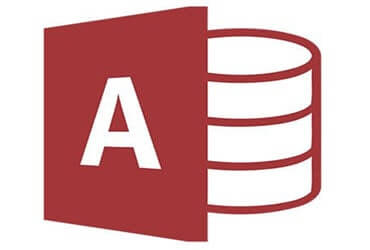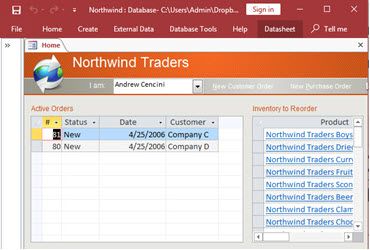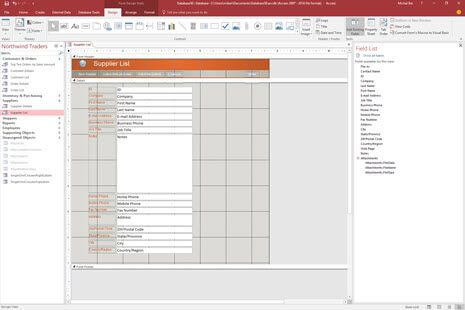
MS Access As A Dev Tool
Access continues to be a highly efficient tool for business database development.
Don't let a broken database ruin your business. We repair broken databases, program
custom Microsoft Access databases, convert Excel to Access, and upgrade old Access
databases to the latest version. Call (323) 285-0939 now for a FREE consultation.
Plus => Check out our FAQ section below.
The Best Microsoft Access Database Solutions owner, consultant, and principal programmer is Alison Balter — a recognized expert Microsoft Access consultant. Alison is the author of 15 Microsoft Access training books and videos. She is a frequent guest speaker at MS Access conferences and has developed hundreds of applications for businesses of all types.
We listen to your concerns, ask questions, and gather information from all stakeholders. We design the right database architecture and deliver the dashboards, queries, forms, and reports you need for an excellent database system.

Your data is critical to your business, requiring fast entry and retrieval. Our Microsoft Access programmer team builds efficient, secure, and user-friendly databases tailored to your needs.
Our custom applications use MS Access as a front-end connected to a robust SQL Server back-end, enabling you to capture, analyze, and report business-critical data for operations and decision-making in El Monte.
We create fast, secure ASP.NET websites and applications to display your data online, providing a modern, integrated interface for your database.








Access continues to be a highly efficient tool for business database development.

How to create a Microsoft Access application with some unique tips and tricks.

Your Access developer near me has some great info for you about using Access efficiently.
Answer: The decision to move from Excel to Microsoft Access depends on several key factors that indicate your data management needs have outgrown spreadsheet capabilities. Most businesses should consider Access when their Excel files exceed 50 MB in size, contain more than 100,000 records, or require multiple users to access data simultaneously.
Excel works well for basic calculations and simple data storage, but it becomes problematic when you need data relationships between different information sets. If you find yourself maintaining separate spreadsheets for customers, orders, and products, then manually cross-referencing information between files, Access provides a much better solution. Access databases handle these relationships automatically through properly designed table structures.
Performance issues represent another migration trigger. When Excel files take several minutes to open, crash frequently, or slow down your computer's performance, your data has likely exceeded Excel's practical limits. Access handles large datasets more efficiently and maintains consistent performance even with hundreds of thousands of records.
Multiple user access creates significant problems in Excel. When several employees need to update the same information, Excel requires complex sharing setups that often lead to data conflicts and version control issues. Access supports true multi-user environments where different people can work with the same data simultaneously without corruption risks.
Data integrity concerns also drive many businesses toward Access. Excel allows users to accidentally delete formulas, modify data formats, or corrupt calculations. Access provides data validation rules, user permissions, and structured data entry that prevent these common problems. You can control who accesses specific information and what changes they're allowed to make.
The migration process typically takes 2-4 weeks depending on your data complexity. We convert your existing Excel data, recreate your calculations as database queries, and build user-friendly forms that make data entry easier than spreadsheet work. Most businesses see immediate improvements in data accuracy and staff productivity after the conversion.
Answer: Microsoft Access has a hard file size limit of 2 GB per database file, though performance issues typically begin around 1.5 GB. When your database approaches this limit, you'll experience slower queries, longer load times, and increased risk of database corruption. However, reaching this limit doesn't mean you need to abandon Access entirely.
The most effective solution involves creating a hybrid database system that uses SQL Server as the backend data repository while keeping your familiar Access interface as the frontend. This approach, called "upsizing," allows you to maintain all your existing forms, reports, and user interface elements while removing the 2 GB storage restriction. SQL Server can handle databases measuring hundreds of gigabytes or even terabytes.
During the upsizing process, we migrate your data tables to SQL Server while your Access database becomes a "frontend" that connects to the server data. Your staff continues using the same familiar interface they know, but the system now supports unlimited data growth and multiple simultaneous users without performance degradation.
Alternative solutions include database splitting, where we separate your data tables from forms and reports into different Access files. This approach works for smaller datasets but doesn't eliminate the 2 GB limit entirely. Another option involves archiving older records to separate databases, though this creates data management complexity for historical reporting.
Performance optimization can sometimes extend your current database's lifespan before requiring major changes. We can compress your database, remove unused objects, and implement more efficient query structures that reduce file size and improve speed. However, these are temporary solutions if your data continues growing.
The upsizing process typically requires 3-5 business days depending on your database complexity. We handle the entire migration process, test all functionality thoroughly, and provide training to ensure your staff can work effectively with the new system. Most businesses experience significant performance improvements and gain the ability to scale their operations without future database limitations.
Answer: Access database corruption can occur due to power failures, network interruptions, hardware problems, or improper database closure. When corruption happens, immediate action is critical because delayed recovery attempts often result in permanent data loss. Our systematic recovery approach maximizes the chances of retrieving your business-critical information.
The first step involves attempting repair using Microsoft's built-in "Compact and Repair Database" utility. This tool fixes minor corruption issues and recovers many databases that won't open normally. However, severely corrupted databases often require more advanced techniques that go beyond the standard repair tools.
When standard repairs fail, we use specialized database recovery software that can extract data from damaged file structures. These tools can often recover records even when Access reports the database as completely unusable. We then reconstruct the database structure, recreate relationships between tables, and rebuild forms and reports using the recovered data.
Manual data extraction represents our most advanced recovery technique for severely damaged databases. This process involves analyzing the database file structure at the binary level to locate and extract readable data fragments. While time-intensive, this approach can recover information from databases that other methods cannot repair.
Prevention remains more effective than recovery. We implement several protective measures for our clients including automated backup systems that create multiple daily copies of their databases. We also recommend splitting databases to separate data from interface elements, reducing corruption risks. Network storage configurations and proper database closure procedures further minimize corruption possibilities.
Recovery timeframes vary based on corruption severity and database size. Simple repairs often complete within hours, while complex manual extractions may require 2-3 business days. We provide regular progress updates and can often restore partial functionality quickly while completing full recovery. Our success rate exceeds 95% for databases that haven't suffered physical hard drive damage.
When your El Monte, California business needs professional Microsoft Access programming services, call us at (323) 285-0939 for immediate assistance. Our experienced database developers provide comprehensive Access solutions that help El Monte companies manage their data more effectively and improve operational efficiency.
MS Access Solutions brings over 25 years of database programming experience to businesses throughout El Monte and surrounding areas. We understand that growing companies often start with Excel spreadsheets but quickly outgrow those limitations as their data becomes more complex and requires multiple user access. Microsoft Access provides a great foundation for small to medium-sized database applications, offering powerful data management capabilities without the complexity of enterprise-level systems.
Our expert Access programmers deliver a complete range of database services that help El Monte businesses harness the full power of Microsoft Access for their operations:
Microsoft Access programming using Visual Basic for Applications allows us to create sophisticated business applications that integrate seamlessly with your existing Microsoft Office tools. Whether you need automated reporting systems, complex data validation rules, or custom user interfaces, our VBA expertise delivers solutions that grow with your business needs.
Get more information about our Microsoft Access programmer services on the Microsoft Access Programmer web page.